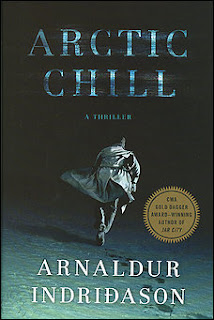Arctic Chill
 Arctic Chill, by Arnaldur Indridason, is the first book I've ever read that's been translated from the Icelandic, which provides an interesting experience that is both good and bad.
Arctic Chill, by Arnaldur Indridason, is the first book I've ever read that's been translated from the Icelandic, which provides an interesting experience that is both good and bad.Though set in Iceland, it's in many ways a conventional police procedural that touches on a sensitive subject to many Western nations--immigration. A ten-year-old boy, the son of an immigrant from Thailand, is found murdered. The investigators suspect that there may be a racial motive. Apparently Iceland, like many other countries these days, has people who are not happy with the mongrelization of the races. I suspect that it's even more touchy in a homogeneous country like theirs that has no history of large-scale immigration, like the U.S. or even Great Britain.
The book, apparently one of a series about the main detective, Erlander, covers the police investigation, which also includes a woman, Elinborg, and a junior investigator, Sigurdur Oli, who has some interesting character traits that make for decent drama. Erlander is an older fellow who has two estranged adult children and likes to read about people who have harrowing experiences in nature. This is perhaps because, as a child, he was trapped in a blizzard and his brother disappeared and is presumed dead.
The drawback of the book is the dialogue, which may be a problem with translation. I found it simplistic and inauthentic. I wonder how a phrase in Icelandic could be translated as "hunky dory." The good part of the book is the incredible sensation of sorrow whenever it touches on the dead boy, a kid who was growing up in a world not of his making (the author is clear pointing out the boy was born in Iceland, but is still seen as an outsider). When Erlander looks through his schoolbooks or he is described walking home from school in the snow I couldn't help but get a lump in my throat. It seems that no the world over, it's hell being a kid.


The drawback of the book is the dialogue, which may be a problem with translation. I found it simplistic and inauthentic. I wonder how a phrase in Icelandic could be translated as "hunky dory."
ReplyDeleteCan't say that I speak Icelandic, but from what I know of it and Scandinavian, it's a language that like the country itself seldom has had to adapt itself to outside influences. They still use letters that the other Nordic countries consider to be runes.
But even so, I don't think it's a bad translation as much as Indridason's language, which critics in Sweden have commented on as well.